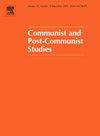Displays of Statehood
IF 1.3
4区 社会学
Q3 INTERNATIONAL RELATIONS
引用次数: 0
Abstract
Drawing on a qualitative analysis of primary sources and interviews with members of representative offices, this article shows how five post-Soviet de facto states—Transnistria, South Ossetia, Abkhazia, the so-called Donetsk People’s Republic (“DPR”), and Luhansk People’s Republic (“LPR”)—engage in activities of international representation by borrowing from diverse repertoires of diplomatic practices, generating hybrid practices of their own. On the one hand, they are attentive to looking like bona fide states and to displaying material and symbolic attributes of statehood through mimicking state-led diplomacy. On the other, they resort to creativity and innovation to partially compensate for the constraints intrinsic to their ambivalent status and complete their repertoire with practices similar to those of transnational advocacy networks, especially regarding information politics and public diplomacy. Overall, the article aims to contribute to the field of contested statehood, as well as to the study of the international engagement of non-state actors in situations of liminality in the international system.建国展示
通过对主要资料的定性分析和对代表处成员的访谈,本文展示了五个后苏联事实上的国家——德涅斯特河沿岸、南奥塞梯、阿布哈兹、所谓的顿涅茨克人民共和国(“DPR”)和卢甘斯克人民共和国(“LPR”)——如何通过借鉴各种外交实践,形成自己的混合实践,参与国际代表活动。一方面,他们注重看起来像一个真正的国家,并通过模仿国家主导的外交来展示国家地位的物质和象征属性。另一方面,他们诉诸创造力和革新,部分补偿其矛盾地位所固有的限制,并以类似于跨国宣传网络的做法,特别是在信息政治和公共外交方面,完成他们的曲目。总体而言,本文旨在为有争议的国家地位领域做出贡献,并研究非国家行为体在国际体系中有限的情况下的国际参与。
本文章由计算机程序翻译,如有差异,请以英文原文为准。
求助全文
约1分钟内获得全文
求助全文
来源期刊

Communist and Post-Communist Studies
Multiple-
CiteScore
1.90
自引率
0.00%
发文量
23
期刊介绍:
Communist and Post-Communist Studies is an international journal covering all communist and post-communist states and communist movements, including both their domestic policies and their international relations. It is focused on the analysis of historical as well as current developments in the communist and post-communist world, including ideology, economy and society. It also aims to provide comparative foci on a given subject by inviting comments of a comparative character from scholars specializing in the same subject matter but in different countries.
 求助内容:
求助内容: 应助结果提醒方式:
应助结果提醒方式:


